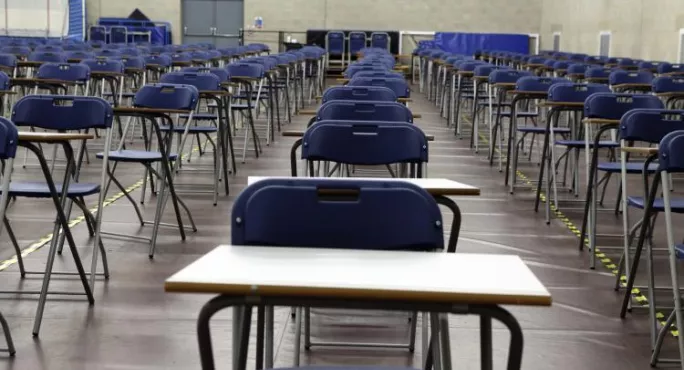Ofqual has taken extraordinary action to stop pupils, who it believes were inappropriately entered for a higher tier GCSE science paper, from walking away with U grades.
The regulator has taken the highly unusual step of intervening over the fail grades for GCSE combined science after it found that more than expected were getting an unclassified result.
Ofqual has allowed examiners to look at the work pupils did on the higher tier paper and judged whether it would have been enough to secure them two grade 3s, had they sat the foundation tier paper for the double GCSE.
But the watchdog has refused to disclose how many students have been affected.
As part of its exam reforms, the government replaced the old GCSE science and GCSE "additional science" with a new double award GCSE in "combined science".
Students sat the reformed qualification for the first time this summer, and because the content is the same size as two GCSEs, candidates will receive a double grade ranging from 9-9, 9-8, 8-8 through to 1-1.
As with a number of other GCSEs, the new qualification is tiered, meaning teachers have to choose whether to enter their students for the higher tier paper (where the range of possible grades stretches from 9-9 to 4-4) or the foundation tier (which is targeted at grades 5-5 to 1-1).
Ofqual also allows a "safety net" grade in the higher tier paper for students who fall just below the 4-4 boundary, but who have done sufficient work to merit not receiving a U grade.
This year the safety net grade for combined science was supposed to be 4-3. But with just a few days to go before GCSE results day, Ofqual has intervened to lower the safety net to 3-3 after a larger than expected number of students looked set for a U because they had been inappropriately entered for the higher tier.
GCSE students 'entered for wrong tier'
In a blog post published this afternoon, Cath Jadhav, associate director of standards and comparability at Ofqual, said: “During the awarding period, exam boards reported to us that, while they were confident in standards set at 4-4, there were more students than expected getting an unclassified result on higher tier combined science.
“When judging results against expectations, exam boards believed that in some cases students should have been entered for the foundation tier.
“For some students, if they had taken the foundation tier papers, they would have achieved a grade. Receiving an unclassified result because they had been entered for higher tier would have misrepresented their ability.
“Therefore, we decided to allow exam boards to use grade 3-3 on the higher tier for this summer, matching grade 3-3 on the foundation tier. Senior examiners in each of the exam boards have reviewed the work of students at this grade and confirmed that it is of an appropriate standard.
Ms Jadhav added: "The exam boards are contacting schools and colleges this week to explain the use of this grade and will be providing further support to them before they make tier entry choices in 2019.”
This year 372,000 students sat the combined science GCSE, but Ofqual has refused to say how many students have been impacted by today's announcement.
Tes understands that those students who have seen their grades bumped up to 3-3 did correctly answer some questions on the higher tier paper.
However, there will still be some students who will get a U grade having sat the higher tier because they were unable to show that they had met a good enough standard to receive a 3-3.
Full GCSE results will be published on Thursday 23 August.





